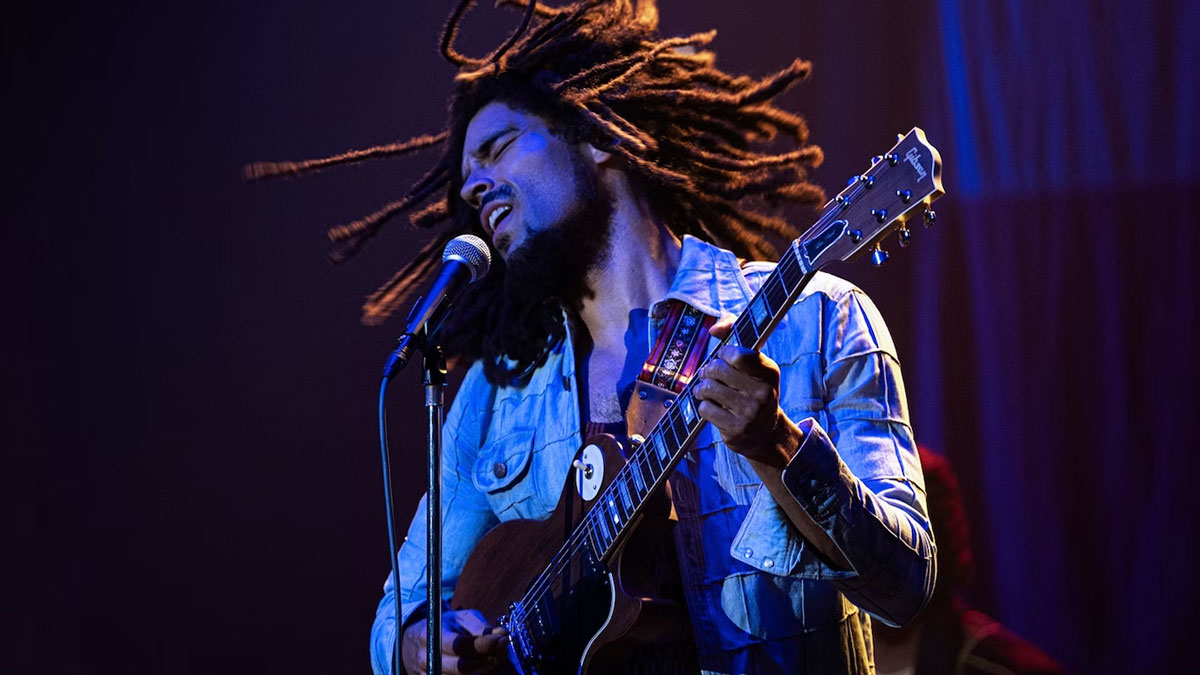About death, about love. Bob Marley, gone too soon at just 36 on May 11, 1981, left behind an incomparable legacy, both musical and more. An idiosyncratic talent, with a fusion of “one love,” he became an icon in the making, his music touching on activism and geopolitics, with a vocabulary that became universal, an attitude that won converts: “Jah” and “Rastafari,” weed and dreads, so redemptive they could stop a bullet “a millimeter from Rita’s brain.”
For a refresher or, let’s be bold, a deep dive, February 22 brings to our theaters Bob Marley: One Love, celebrated with the approval and collaboration of the Marley family, honoring the reggae deity and his message of universal unity. For the first time on the big screen, he is portrayed by Kingsley Ben-Adir, who is indeed cool but “doesn’t pierce” and “doesn’t dance,” while Rita is played by Lashana Lynch, somewhat sullen: together they make a couple, in a relationship of indeed variable geometry, with a plethora of children from conjugal and non-conjugal unions, and the makings of an extended family ad libitum. Directed by Reinaldo Marcus Green of King Richard fame, which won Will Smith an Oscar, the undeniable highlight is the music, including songs to which Ben-Adir lends his own voice: the producers, among them Bob’s son Ziggy and Brad Pitt with his Plan B, hope to replicate the success of the “fraternal twins” Bohemian Rhapsody and Elvis, and the chances are there. The screenplay by Terence Winter, Frank E. Flowers, Zach Baylin, and the director himself, the cast also includes James Norton, Tosin Cole, Umi Myers, Anthony Welsh, and Nia Ashi, the tranche de vie is cut in 1976 when Bob tries to end the emerging civil war with a concert, a program in itself: Smile Jamaica.
Can music really change the world? Some believe so, to the point of setting up an ambush: Bob is almost unscathed, Rita should thank her “braids,” the manager Don Taylor steps between the killer and his charge and takes a few bullets. They all survive, and Marley performs, throwing heart and decibels over the fratricidal hurdle: something good comes of it, but not enough to allow him to stay in his homeland. He heads to England, where he is arrested for possession of ganja and records that seminal album, Exodus. There’s more, and it’s grim: in 1977, a soccer injury, specifically a wound to his big toe, reveals acral melanoma. It will mark the end, but not before two politically charged highs: the concert in Zimbabwe in his Africa and the One Love Peace Concert in Jamaica, which brings together the two rival leaders Michael Manley and Edward Seaga, both white. It may surprise the less informed that Bob’s father was also white, British, while it’s no surprise at all that Ziggy gets a solo son treatment on screen, even though daddy had a dozen others.
The power of patronage, tempering the biopic’s conflicts and gilding the prestigious rasta protagonist: between ska and reggae weaves a song of a single note, apologetic, and don’t pacifists also get killed for the sake of love? The risk is palpable, but Bob Marley: One Love sounds good, even more so under the spell of Sanremo: is that enough?
Federico Pontiggia
Il Fatto Quotidiano, February 10, 2024





